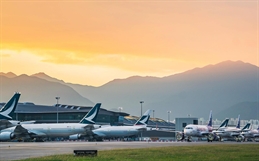
Cathay Pacific continued to report increased cargo performance this year, with February volumes increasing double-digits compared to last year, buoyed by a recovery in demand following years of a slump due to Covid-19 restrictions.
The Hong Kong-based carrier carried 103,932 tonnes of cargo last month, an increase of 59.6% compared with February 2022, when Cathay's cargo capacity was significantly reduced due to stricter aircrew quarantine measures in the city.
February's cargo performance was also higher than the 95,139 tonnes of cargo that it handled in January 2023.
Cathay carried 106,471 tonnes of cargo in December 2022 and 103,092 tonnes of cargo handled by the carrier in November last year.
"Looking at our cargo business, tonnage grew 9% in February compared to January, reflecting the gradual recovery in demand following the Lunar New Year holidays," said Lavinia Lau, chief customer and commercial officer.
She added that inbound demand from the Americas, Europe, Northeast Asia and Southwest Pacific "remained steady," especially across our special solutions, such as Cathay Fresh and Cathay Pharma.
"Ad-hoc demand from Southeast Asia, as well as South Asia, the Middle East and Africa (SAMEA), also helped fill the gaps left by demand from Hong Kong and the Chinese Mainland on long-haul routes," Lau added.
For February, Cathay said cargo revenue tonne kilometres (RFTKs) increased 153.9% year-on-year and cargo load factor decreased by 13.7 percentage points to 66.7%, while capacity, measured in available cargo tonne kilometres (AFTKs), increased by 206.1% year-on-year.
In the first two months of 2023, the tonnage increased by 42.8% against a 201.3% increase in capacity and a 147.4% increase in RFTKs, as compared with the same period for 2022.
Cargo outlook
Looking ahead, the Cathay chief customer and commercial officer signalled optimism for further recovery as the airline seeks to build back its capacity and network while noting new developments in its cargo business.
"February saw a number of exciting new developments, including the launch of Cathay Cargo – a rebrand of our cargo business. The change aligns with the Cathay Group's overarching ambition to 'Move Beyond' and reinforces our cargo business's commitment to offering leading-edge services to our customers," Lau said.
She also noted that Cathay Cargo became the first airline — and Cathay Pacific Services Limited the first cargo terminal operator — to utilise the Hong Kong International Airport (HKIA) Logistics Park in Dongguan, which Lau said would enable the carrier to offer its customers seamless sea-air shipments from the Greater Bay Area (GBA) directly into HKIA for outbound airfreight.
"On the cargo side, demand from our home market, Hong Kong, as well as the Chinese Mainland, is increasing, with e-commerce-related traffic picking up relatively more quickly. We are progressively expanding our network coverage as more of our passenger flights are resumed," the Cathay chief customer and commercial officer further said.
The report noted Cathay is making good progress in increasing its capacity and rebuilding connectivity at the Hong Kong international aviation hub. Lau said by the end of March, the Cathay Group will be operating approximately 50% of pre-pandemic passenger flight capacity, covering more than 70 destinations — which would also help boost cargo capacity on belly hold.
Earlier, Cathay Cargo already noted a "positive start to the year" and is seeing more cargo flows on the back of the expected boost from its revamped services as well as the lifting of pandemic restrictions both in Hong Kong and mainland China.



